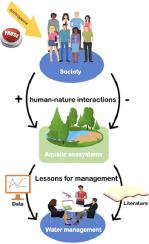Water Research ( IF 12.8 ) Pub Date : 2022-08-03 , DOI: 10.1016/j.watres.2022.118934 Margaret Armstrong 1 , Hazal Aksu Bahçeci 2 , Ellen van Donk 3 , Asmita Dubey 2 , Thijs Frenken 2 , Berte M Gebreyohanes Belay 2 , Alena S Gsell 2 , Tom S Heuts 4 , Lilith Kramer 5 , Miquel Lürling 1 , Maarten Ouboter 6 , Laura M S Seelen 7 , Sven Teurlincx 2 , Nandini Vasantha Raman 2 , Qing Zhan 2 , Lisette N de Senerpont Domis 8

|
The anomalous past two years of the COVID-19 pandemic have been a test of human response to global crisis management as typical human activities were significantly altered. The COVID-instigated anthropause has illustrated the influence that humans and the biosphere have on each other, especially given the variety of national mobility interventions that have been implemented globally. These local COVID-19-era restrictions influenced human-ecosystem interactions through changes in accessibility of water systems and changes in ecosystem service demand. Four urban aquatic case studies in the Netherlands demonstrated shifts in human demand during the anthropause. For instance, reduced boat traffic in Amsterdam canals led to improved water clarity. In comparison, ongoing service exploitation from increased recreational fishing, use of bathing waters and national parks visitation are heightening concerns about potential ecosystem degradation. We distilled management lessons from both the case studies as well as from recent literature pertaining to ecological intactness and social relevance. Equally important to the lessons themselves, however, is the pace at which informed management practices are established after the pandemic ends, particularly as many communities currently recognize the importance of aquatic ecosystems and are amenable to their protection.
中文翻译:

掀起波澜:从荷兰 COVID-19 人类停滞中汲取的城市水生生态系统服务供应和管理经验教训
过去两年 COVID-19 大流行的异常情况一直在考验人类对全球危机管理的反应,因为典型的人类活动发生了显着变化。COVID 引发的人类停滞说明了人类和生物圈之间的相互影响,尤其是考虑到全球范围内实施的各种国家流动性干预措施。这些当地 COVID-19 时代的限制通过水系统可达性的变化和生态系统服务需求的变化影响了人类与生态系统的相互作用。荷兰的四项城市水生案例研究表明,人类停滞期间人类需求发生了变化。例如,阿姆斯特丹运河的船只交通减少导致水的透明度提高。相比之下,不断增加的休闲捕鱼服务剥削,沐浴水的使用和国家公园的参观加剧了人们对潜在生态系统退化的担忧。我们从案例研究以及最近有关生态完整性和社会相关性的文献中提炼出管理经验。然而,对课程本身同样重要的是大流行结束后建立知情管理实践的速度,特别是因为许多社区目前认识到水生生态系统的重要性并愿意对其进行保护。


























 京公网安备 11010802027423号
京公网安备 11010802027423号